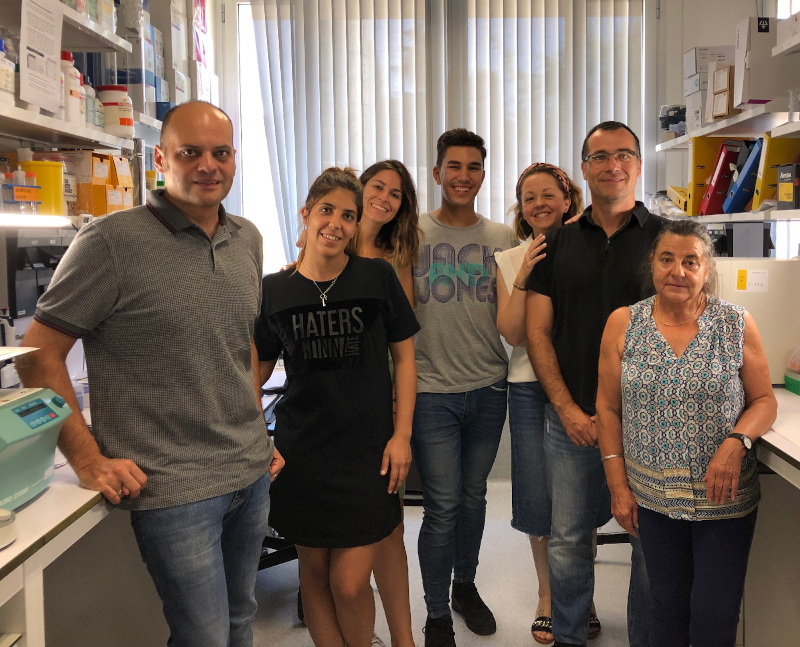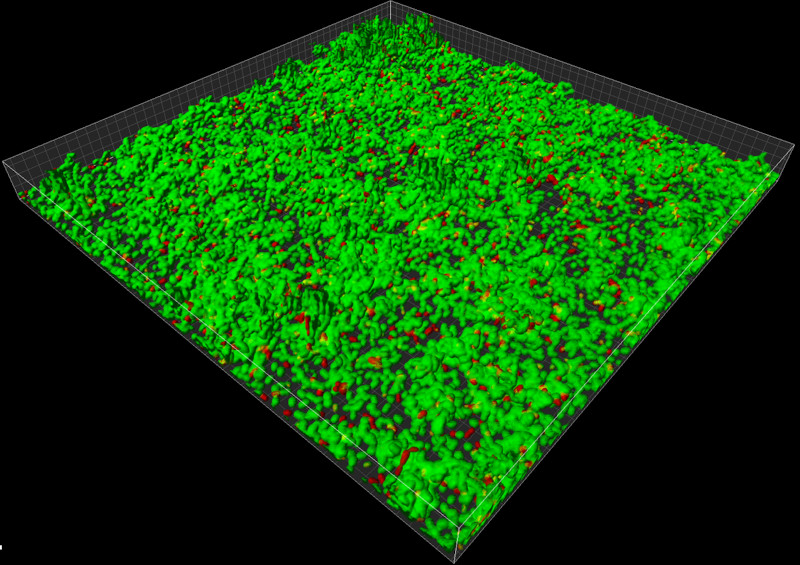
Group photo. Jose Yuste, Fernando Gonzalez-Camacho, and Mirian Domenech
Jose Yuste, Fernando Gonzalez-Camacho, and Mirian Domenech Jose Yuste, Fernando Gonzalez-Camacho, and Mirian Domenech analyzing the serotypes, genotypes and antibiotic resistance of the pneumococcal clinical isolates received in the laboratory from hospitals in the different autonomous communities. Since then, nearly 85,000 invasive pneumococcal clinical isolates have been identified and characterized and are available in our strain collection. Every year we report cases of invasive pneumococcal disease to Europe through the ECDC, being the third European country that reports the most cases. The LRN is coordinated by Dr. José Yuste and is subdivided into two units; on the one hand, the diagnostic and epidemiological part formed by three research assistants (María Dolores Vicioso, Idoia del Río and Beatriz López) and the research part, formed by Dr. Fernando González Camacho, Dr. Mirian Domenech and Julio Sempere who is doing his doctoral thesis. The main lines of research of the laboratory are set out below.
Research in epidemiology and public health
In recent years we have developed small organic compounds (bicyclic amine esters or EBAs) that disrupt the cell membrane and have a lytic effect on both Gram-negative respiratory pathogens ( It is the main etiological agent of community-acquired pneumonia and one of the main causes of sepsis and non-epidemic bacterial meningitis, mainly affecting the pediatric population and adults over 65 years of age. Our laboratory participates in the characterization of circulating strains (serotype, genotype and antibiotic sensitivity) providing very valuable information to the national health system on the epidemiology of pneumococcus, which is essential for the early detection of emerging clones and serotypes, which can be very useful. to assess the impact of current and future available vaccines. Among the techniques used, the characterization of pneumococci by means of dot blot with antisera, MLST and PCR-sequencing of capsular genes.
Molecular mechanisms of pathogenicity
For several years, our laboratory has been focused on the study of the molecular mechanisms related to the different stages of the infectious process, among which the colonization of the upper respiratory tract, the establishment of pneumonia and its dissemination, producing invasive disease, stand out. To achieve these goals, our laboratory uses mutants in various virulence factors, epithelial cell lines, phagocytic cells (macrophages and neutrophils), as well as mice deficient in important receptors of the host immune system. In order to address these studies, flow cytometry and confocal microscopy are used as the main methodological techniques.
Search for vaccine antigens based on conserved proteins
The currently available vaccines are based on capsular polysaccharides that may or may not be conjugated to a carrier protein. Due to the high variability of pneumococcus (99 serotypes), the limitation in the number of serotypes that can be included in a polysaccharide vaccine and the phenomenon of replacement of serotypes, alternative vaccines to the current ones are being studied. In our group we are characterizing the protective role of some highly conserved surface proteins. In 2016 we demonstrated that vaccination with the LytB protein is capable of protecting against sepsis and pneumonia, including serotype 3, which has a high capsule and, in fact, was selected in the highlights of the magazine.
Importance of pneumococcal biofilms in pathogenesis and lethality
of the magazine.

Figure 1. of the magazine.
Relevant bibliography of the different lines of research
Domenech M, Sempere J, de Miguel S, Yuste J. Domenech M, Sempere J, de Miguel S, Yuste J.
Literate PDomenech M, Sempere J, de Miguel S, Yuste J. Bactericidal synergism between antibiotics and phage endolysin Cpl-711 to kill multidrug-resistant pneumococcusDomenech M, Sempere J, de Miguel S, Yuste J.
Corsini B, Díez-Martínez R, Aguinagalde L, González-Camacho F, García-Fernández E, Letrado P, García P, Yuste J. Domenech M, Sempere J, de Miguel S, Yuste J.
Domenech M, Sempere J, de Miguel S, Yuste J. Immunization with LytB protein of Streptococcus pneumoniae Domenech M, Sempere J, de Miguel S, Yuste J.
Ramos-Sevillano E, Urzainqui A, de Andrés B, González-Tajuelo R, Domenech M, González-Camacho F, Sánchez-Madrid F, Brown JS, García E, Yuste J. Ramos-Sevillano E, Urzainqui A, de Andrés B, González-Tajuelo R, Domenech M, González-Camacho F, Sánchez-Madrid F, Brown JS, García E, Yuste J.
Ramos-Sevillano E, Urzainqui A, de Andrés B, González-Tajuelo R, Domenech M, González-Camacho F, Sánchez-Madrid F, Brown JS, García E, Yuste J. Emergence of amoxicillin-resistant variants of SpainRamos-Sevillano E, Urzainqui A, de Andrés B, González-Tajuelo R, Domenech M, González-Camacho F, Sánchez-Madrid F, Brown JS, García E, Yuste J.Ramos-Sevillano E, Urzainqui A, de Andrés B, González-Tajuelo R, Domenech M, González-Camacho F, Sánchez-Madrid F, Brown JS, García E, Yuste J.
Aguinagalde L, Díez-Martínez R, Yuste J, Royo I, Gil C, Lasa Í, Martín-Fontecha M, Marín-Ramos NI, Ardanuy C, Liñares J, García P, García E, Sánchez-Puelles JM. , Díez-Martínez R, Yuste J, Royo I, Gil C, Lasa Í, Martín-Fontecha M, Marín-Ramos NI, Ardanuy C, Liñares J, García P, García E, Sánchez-Puelles JM. Streptococcus pneumoniae and Staphylococcus aureus , Díez-Martínez R, Yuste J, Royo I, Gil C, Lasa Í, Martín-Fontecha M, Marín-Ramos NI, Ardanuy C, Liñares J, García P, García E, Sánchez-Puelles JM. , Díez-Martínez R, Yuste J, Royo I, Gil C, Lasa Í, Martín-Fontecha M, Marín-Ramos NI, Ardanuy C, Liñares J, García P, García E, Sánchez-Puelles JM.
, Díez-Martínez R, Yuste J, Royo I, Gil C, Lasa Í, Martín-Fontecha M, Marín-Ramos NI, Ardanuy C, Liñares J, García P, García E, Sánchez-Puelles JM. Pleiotropic effects of cell wall amidase LytA on Streptococcus pneumoniae , Díez-Martínez R, Yuste J, Royo I, Gil C, Lasa Í, Martín-Fontecha M, Marín-Ramos NI, Ardanuy C, Liñares J, García P, García E, Sánchez-Puelles JM.
, Díez-Martínez R, Yuste J, Royo I, Gil C, Lasa Í, Martín-Fontecha M, Marín-Ramos NI, Ardanuy C, Liñares J, García P, García E, Sánchez-Puelles JM. Emerging non-PCV13 serotypes 11A and 35B of Streptococcus pneumoniae show high potential for biofilm formation in vitro, Díez-Martínez R, Yuste J, Royo I, Gil C, Lasa Í, Martín-Fontecha M, Marín-Ramos NI, Ardanuy C, Liñares J, García P, García E, Sánchez-Puelles JM.
, Díez-Martínez R, Yuste J, Royo I, Gil C, Lasa Í, Martín-Fontecha M, Marín-Ramos NI, Ardanuy C, Liñares J, García P, García E, Sánchez-Puelles JM. Biofilm formation avoids complement immunity and phagocytosis of Streptococcus pneumoniae, Díez-Martínez R, Yuste J, Royo I, Gil C, Lasa Í, Martín-Fontecha M, Marín-Ramos NI, Ardanuy C, Liñares J, García P, García E, Sánchez-Puelles JM.
